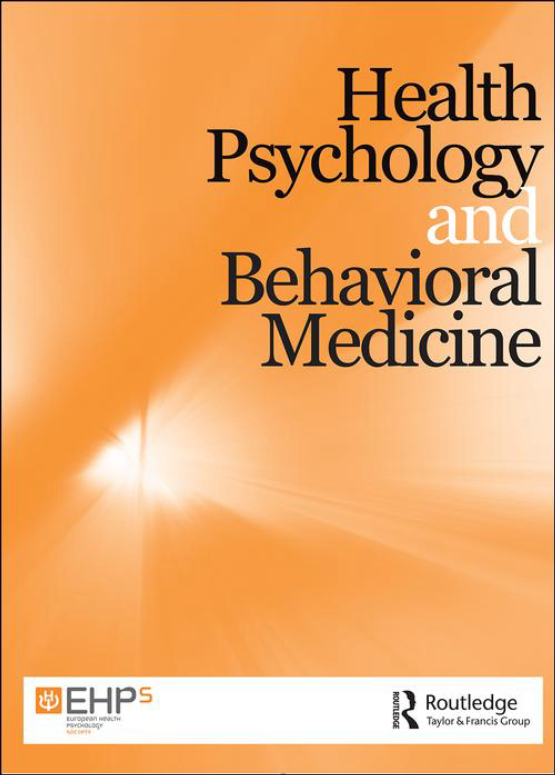Submit a Manuscript to the Journal
Health Psychology and Behavioral Medicine
For an Article Collection on
Understanding and Predicting the Temporal Dynamics of Health and Wellbeing
Manuscript deadline
01 September 2024


Article collection guest advisor(s)
Dr Dario Baretta,
Institute of Psychology, University of Bern
[email protected]
Dr Olga Perski,
University of California, San Diego and Tampere University
[email protected]
Dr Jennifer Inauen,
Institute of Psychology, University of Bern
[email protected]
Understanding and Predicting the Temporal Dynamics of Health and Wellbeing
While many processes related to health and wellbeing (e.g. behavior change) change over time, their understanding and prediction remains scarce. In the last decade, the availability of digital technologies, such as electronic diaries and wearable devices, has opened up new opportunities for collecting intensive longitudinal data on behavioral and psychological variables related to health, wellbeing, and mental health. The existence of such data has great potential for advancing our understanding of these phenomena, and for the development of explanatory theories. This Collection aims to improve our understanding and prediction of the temporal dynamics of psychosocial processes related to health and wellbeing based on studies using intensive longitudinal data. These studies include observational or experimental designs – exploring the within- and between-person, temporal dynamics of behavioral and psychological health-related variables (e.g., physical activity, self-efficacy, habit, affect) and how they unfold and relate to one another other over time.
Identifying and characterizing temporal phenomena from intensive longitudinal data serves two major scientific purposes. First, they can inform and enrich the process of developing, refining, and evaluating theories in health psychology and behavioral medicine that account for temporal dynamics. This is a crucial aspect because theories that omit the temporal dynamical structure of behavioral and psychological processes have limited ecological validity. Second, understanding the temporal aspects of phenomena enables more accurate and valid predictions about psychological and behavioral processes, with significant implications for developing precise interventions targeting health-related behaviors and wellbeing. Therefore, authors are encouraged to think precisely about the temporal aspects of their research questions and consider how findings can contribute to adapting and expanding existing theoretical frameworks as well as improving the precision of theory-driven interventions to promote health-related behaviors and wellbeing.
We invite contributions that use intensive longitudinal data collected via ecological momentary assessment (EMA) or wearable devices to investigate temporal dynamics of behavior change processes, wellbeing, and mental health. Such studies may be observational, experimental, or interventional. Topics may include, but are not limited to:
- Temporal trajectories of psychological constructs (e.g., habit formation, self-efficacy, perceived stress) and behaviors (e.g., physical activity, smoking, diet) that are key for health and wellbeing.
- The time-varying association between psychological constructs or between psychological constructs and behavior.
- The temporal effects of psychosocial and behavioral interventions to promote health and wellbeing and prevent illness.
- Dynamic theory testing (i.e., testing dynamic hypotheses arising from health or clinical psychology theories using appropriate statistical methods).
Other contributions such as systematic reviews and position papers are welcome if they relate closely to improving our understanding of or our approaches to study the temporal dynamics of health and wellbeing, including implications for theory development and refinement.
The use of Open Science practices (e.g., pre-registration of study protocols and analytic plans, sharing of data, analytic code and study materials) are strongly encouraged.
Dario Baretta is a postdoctoral researcher working in the Department of Health Psychology and Behavioral Medicine at the University of Bern. He obtained his PhD in Social Psychology from the University of Milan-Bicocca in 2018. Before his current appointment, he worked as a data scientist in the consulting sector. His main research interest concerns the study of physical activity behavior and its determinants. His research is mostly based on intensive longitudinal data and guided by a phenomenological approach to science.
Olga Perski is an interdisciplinary researcher working at the intersection of behavioural science and technology. She obtained her PhD in Health Psychology from University College London in 2018. Olga is currently a Marie Sklodowska-Curie Postdoctoral Research Fellow at the University of California, San Diego and Tampere University. Her research is focused on the technology-enabled, real-time assessment and modelling of within-person processes and associated “just-in-time adaptive interventions”, which can provide the right type of support to people, when it’s most needed.
Jennifer Inauen is an Associate Professor of Health Psychology and Behavioral Medicine at the University of Bern, Switzerland. Her research aims to understand the principles of health behavior change, which she studies at the example of healthy eating, physical activity, hygiene, safe water consumption and more. Using mobile technology and intensive-longitudinal designs in daily life, she seeks to understand behavior change processes over time, focusing on intra- and interindividual differences.
Benefits of publishing open access within Taylor & Francis
Global marketing and publicity, ensuring your research reaches the people you want it to.
Article Collections bring together the latest research on hot topics from influential researchers across the globe.
Rigorous peer review for every open access article.
Rapid online publication allowing you to share your work quickly.
Looking to Publish your Research?
Find out how to publish your research open access with Taylor & Francis Group.
Choose open accessSubmission Instructions
All manuscripts submitted to this Article Collection will undergo desk assessment and peer-review as part of our standard editorial process. Guest Advisors for this collection will not be involved in peer-reviewing manuscripts unless they are an existing member of the Editorial Board. Please review the journal Aims and Scope and author submission instructions prior to submitting a manuscript.